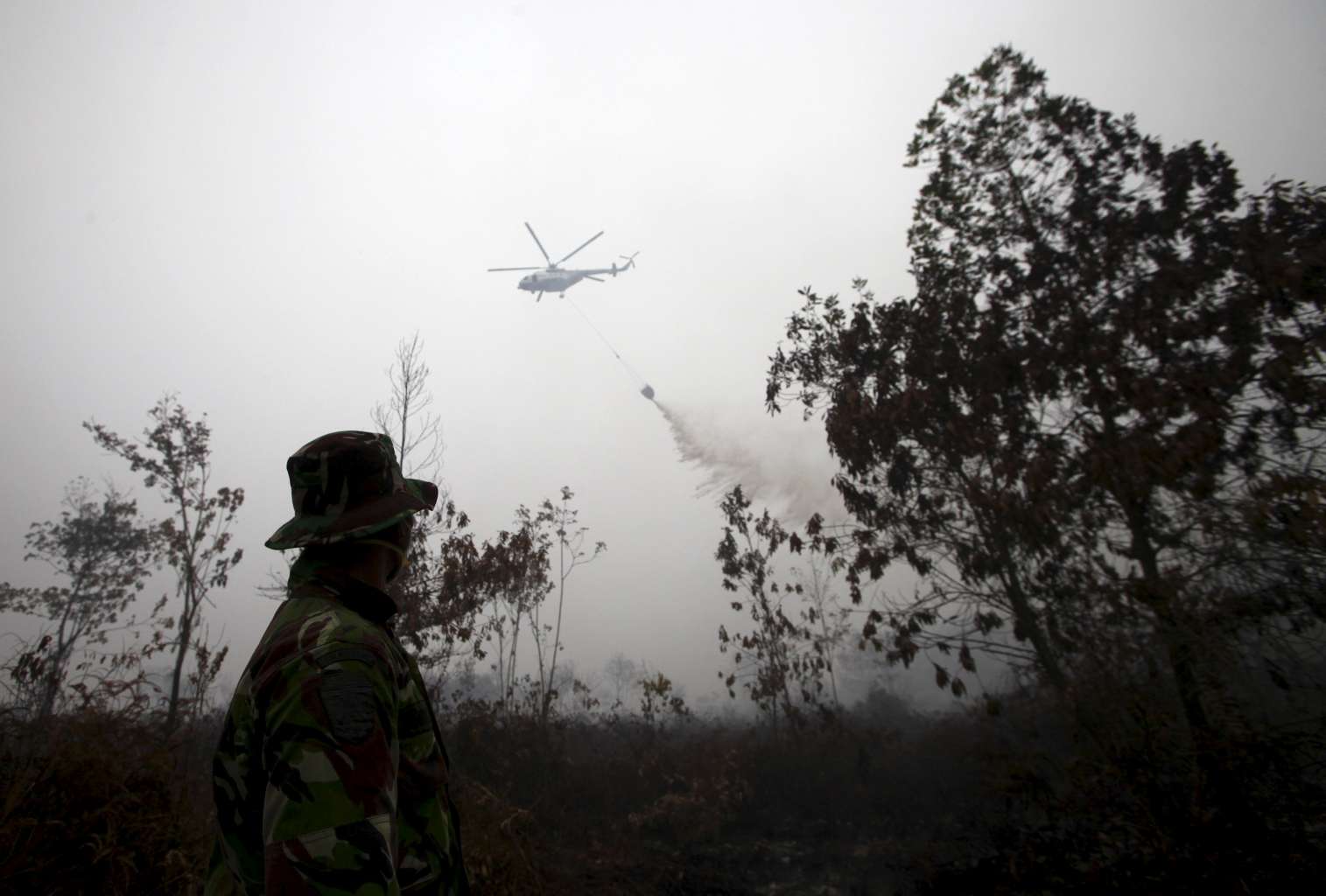The Asian Voice
Sumatra, the suffering paradise: The Jakarta Post
Sign up now: Get insights on Asia's fast-moving developments

An Indonesian soldier watching as a helicopter water bomber releases its cargo over a peatland fire in Kampar, at Riau, Sumatra, on Sept 17, 2015.
PHOTO: REUTERS
Follow topic:
Every year, there is an alarming increase in the number of those admitted to health centres with respiratory problems. But there is no change in conditions.
By Delita Sartika
The Jakarta Post/Asia News Network
For the past three weeks, my social media newsfeed has been filled with images of my hometown of Jambi, which has been shrouded by pollution from forest fires. Similar pictures have also been shared by friends and acquaintances from other provinces in Sumatra, such as Riau and South Sumatra.
Scrolling through the pictures I remembered how distressing and unpleasant it felt to breathe the thick air full of dangerous particulates for months. The smoke also causes dry and itchy eyes that last for days. I cannot even compare it to living in a place where people smoke cigarettes. There is no break or escape from the smoke. People simply have to live in such conditions 24/7, continuously inhaling the poisonous air.
For the last 17 years, forest fires have been an annual occurrence in Sumatra. Around the drier months of July to October, as rain does not fall for a long period of time, the fires become uncontrollable and cause the haze to accumulate and worsen.
Jambi and Pekanbaru residents are likely able to recite by heart news reports explaining the harmful effects of the haze.
Each year news reports cover the alarming increase of people being admitted to health centers due to respiratory and other related health problems, the closing of schools for weeks and countless cancelations of flights due to safety risks.
Broader investigations may visibly include significant economic loss.
Then relevant authorities will follow suit by issuing warnings to people to wear masks, reduce outdoor activities and report health issues immediately to the nearest clinics.
However, despite warnings and news coverage, conditions do not change. Sumatra's annual tragedy continues to only get worse.
Last week, President Joko "Jokowi" Widodo conducted an official visit to South Sumatra to assess areas affected by the forest fires. On his official Facebook page, pictures of the area he visited have been posted, along with words confirming a general decline of hot spots in Sumatra.
Yet, local people found this report questionable as conditions this year have been among the worst in 17 years.
As a matter of fact, suspicious news circulated in local media about the possibility of attempts to tone down reports about the haze. For example, there was an online news article titled "Jokowi cancels visit to Jambi as local government and legislative council report Jambi has zero hot spots".
In addition to the suspicious gap between formal reports and people's real-life experiences, information flow only increases fear in people.
A few days ago, it was reported that a 12-year-old died due to respiratory problems potentially related to the haze. How lethal the haze is to people's health, however, has not been confirmed.
In fact, the confusion between rumors and investigative reports is indeed another side of the haze tragedy. Sensibility in news coverage related to the tragedy is necessary to help diminish irrelevant fears among locals.
I do not know how to make the smoke stop. No one ever does. Apart from the usual placing of blame on palm oil companies and accusing Jakarta of treating non-Java tragedies discriminatively, what I and probably everyone in Sumatra is wondering about at this moment is how a state could become so "muted" to allow such a tragedy to continue for 17 years.
We, the people in the suffering paradise, have placed incredibly high hopes in the current government. President Jokowi has sent troops to Sumatra to investigate and map potential hot spots. While law enforcement might be one of few long-term answers to stop the annual haze, putting potential areas under strict surveillance before next year's dry season seems like a promising preparatory measure. Hopefully this helps reduce the future potency of fires.
I would like to prompt the people of Jambi to take advantage of the upcoming local elections to put pressure on the candidates to end the tragedy once elected. They might offer empty promises in their political campaign, but we must try our best to voice our sufferings.
The writer is a lecturer at Jambi University studying at Monash University in Victoria, Australia.

